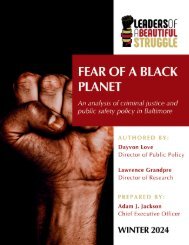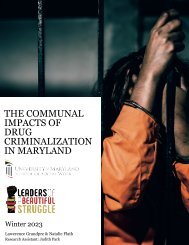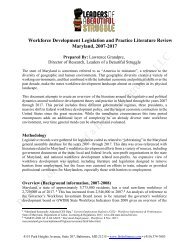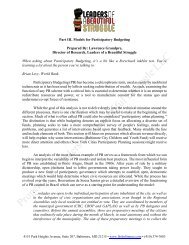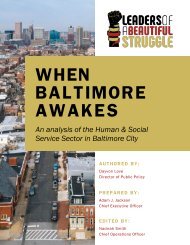Drug Decriminalization in Maryland Through an African Centered Research Paradigm- Analysis and Recommendations
This document offers guidance for theorizing questions related to a proposed research project purposed to advance drug decriminalization in Maryland.
This document offers guidance for theorizing questions related to a proposed research project purposed to advance drug decriminalization in Maryland.
- No tags were found...
Create successful ePaper yourself
Turn your PDF publications into a flip-book with our unique Google optimized e-Paper software.
from the outside, Baudrillard shows us how the ‘evil’ is <strong>in</strong>stead a consequence of the very<br />
logic of the system, of the excessive logic <strong>an</strong>d rationality of a system – <strong>in</strong> this case society<br />
<strong>in</strong> the Industrialized countries – which, hav<strong>in</strong>g reached a certa<strong>in</strong> level of saturation,<br />
secretes <strong>an</strong>tibodies which express its <strong>in</strong>ternal diseases, its str<strong>an</strong>ge malfunctions, its<br />
unforeseeable <strong>an</strong>d <strong>in</strong>curable breakdowns.<br />
With<strong>in</strong> the discourse of Europe<strong>an</strong> modernity, where the social relations between subjects<br />
is presumed to be fully secularized <strong>an</strong>d consequently solely mediated through mutual<br />
recognition of each other’s hum<strong>an</strong>ity, the fear has been that ‘drug use threatens the social<br />
bond’ <strong>an</strong>d summons up the spectre of the sub-hum<strong>an</strong> that persists with<strong>in</strong>.” (Karam, 2019).<br />
The implications of this theory c<strong>an</strong>not be overstated. If Karam is correct, then m<strong>an</strong>y <strong>in</strong> society<br />
don’t see <strong>in</strong>carceration of drug users as a waste of tax revenue, but rather as productive <strong>in</strong>vestment<br />
<strong>in</strong> societal stability. Exclud<strong>in</strong>g the drug user from the realm of the rational precludes <strong>an</strong>alysis of<br />
“evidence-based” drug treatment from be<strong>in</strong>g seen as a productive alternative to <strong>in</strong>carceration;<br />
addicts are not seen as sensible <strong>in</strong>dividuals capable of tak<strong>in</strong>g adv<strong>an</strong>tage of new services, but their<br />
addiction itself is seen as exclud<strong>in</strong>g them from the community of the rational. Ironically, this<br />
obsession with rationality is <strong>in</strong> itself irrational, suffused with racialized assumption around the<br />
Black/Brown others fundamental irrationality be<strong>in</strong>g expressed through <strong>in</strong>toxication. The racial<br />
disparities of the War on <strong>Drug</strong>s are not a “bug” <strong>in</strong> the crim<strong>in</strong>al legal system, they very much are a<br />
feature, where Black <strong>an</strong>d Brown drug users are seen as need<strong>in</strong>g to be conta<strong>in</strong>ed, lest their devi<strong>an</strong>t<br />
cultural traits spread to the broader white community.<br />
Some would counter that the recent turn <strong>in</strong> research toward more compassionate views of<br />
drug users refutes Karam’s <strong>an</strong>alysis. Here it is essential to remember Schiele’s discussions around<br />
the import<strong>an</strong>ce of th<strong>in</strong>k<strong>in</strong>g <strong>in</strong> diunital, rather th<strong>an</strong> dichotomous patterns. Indeed, m<strong>an</strong>y have<br />
viewed the <strong>in</strong>creas<strong>in</strong>g <strong>in</strong>terest <strong>in</strong> “public health” approaches to addictions as explicitly reflective<br />
of a racialized trend <strong>in</strong> addiction treatment, with the rise of opioid addiction <strong>in</strong> white communities<br />
be<strong>in</strong>g seen as the impetus for this shift. Netherl<strong>an</strong>d <strong>an</strong>d H<strong>an</strong>sen argue it is <strong>an</strong> explicitly racialized<br />
fear of “wasted whiteness” with the contagion of addiction impugn<strong>in</strong>g white subjects' ability to<br />
productive neoliberal citizens as responsible for this shift. That explicitly notes a rom<strong>an</strong>ticized<br />
view of Whites <strong>in</strong> Appalachi<strong>an</strong> <strong>Maryl<strong>an</strong>d</strong> as worthy of compassion because of their “hard lives of<br />
m<strong>an</strong>ual labor.” The ideological justification beh<strong>in</strong>d this shift makes their <strong>an</strong>alysis particularly<br />
crucial for this project, as they write:<br />
“...Alcoff, for <strong>in</strong>st<strong>an</strong>ce, argues that “White supremacy is itself <strong>in</strong>coherent <strong>an</strong>d c<strong>an</strong> m<strong>an</strong>ifest<br />
itself quite differently depend<strong>in</strong>g on historical periods <strong>an</strong>d social groups” (2015: 15).<br />
Representations of drugs <strong>an</strong>d the people who use them are <strong>in</strong>fluenced by the complex<br />
4151 Park Heights Avenue, Suite 207, Baltimore, MD 21215 • www.lbsbaltimore.com • (410) 374-7683




